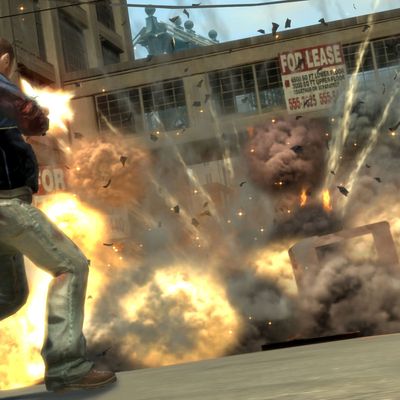
There’s been a long-running internal battle among research psychologists about the connection, or lack thereof, between violent video games and real-world violence. For many years, groups like the American Psychological Association have argued that yes, there is a meaningful link, and there has been a long line of experts with impressive psychological credentials eager to testify about the supposedly pernicious nature of Grand Theft Auto and its ilk.
In recent years, though, the tide has turned a bit. Many researchers have begun to argue that the research on this link is flawed, and they also point out that as video games have exploded in popularity, there’s been a long-running decline in youth violence — a point that doesn’t disprove a link (it could be video games are nudging violence up while other factors are nudging it down more), but which makes it harder to explain why this is something that should be a source of all that much worry.
The latest salvo in this battle comes from Division 46 of the American Psychological Association, which recently released a statement that rather explicitly argues that it is irresponsible, in light of the available evidence, to suggest such a link:
Criminologists who study mass homicides, in their analyses of such crimes, have either excluded the issue of video games (Lankford, 2013), or explicitly referred to links between violent games and mass homicides as a “myth” (Fox & DeLateur, 2014). Yet, very commonly, after young males commit high-profile acts of violence, politicians and news media may speculatively “link” such crimes to violent video games or other violent media. Such claims are not based on research evidence and these claims may distract society from more substantive causes of violence, such as poverty, lack of treatment options for mental health as well as crime victimization among the mentally ill, and educational and employment disparities. With this statement, Division 46 (the American Psychological Association’s division for Media Psychology and Technology) advises policy makers, community officials, and news media to not attribute or insinuate blame for acts of violence on video games or other fictional media.
The document then runs down a bunch of the available research, highlighting flaws in some of the most commonly touted studies claiming to show a link between mass shootings and video games.
“This only reflects the division’s position, not APA as a whole of course,” cautioned Christopher Ferguson, a Stetson University psychologist and the co-author of Moral Combat: Why the War on Violent Video Games Is Wrong, as well as a Division 46 member and co-author of the document, in an email. “But I think we’re the first science group to specifically speak to this issue.”As of 2015, the APA itself claimed that there’s a noteworthy link between video games and violence — a stance that Ferguson and other dissenters were not particularly happy with when it was announced (Ferguson has previously told me he feels those in his camp were cut out of the process, relative to those who believe in the link). So it would be wrong to say there’s a consensus on this issue, but there’s definitely a lot more disagreement among experts than some of the most moral-panicky news coverage of video games might suggest.




